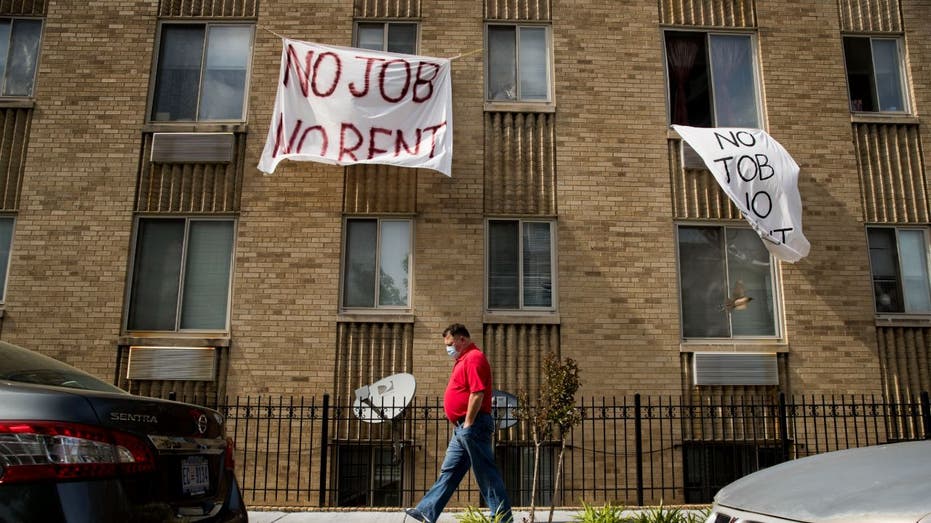Is the CDC's eviction moratorium keeping affordable rentals off the market?
Real estate and housing experts believe the Biden administration’s decision to extend an eviction moratorium until Oct. 3 will have lasting impacts on the housing market.
After initially saying Congress would have to determine whether or not to extend the moratorium, on Wednesday Biden said that the Centers for Disease Control and Prevention would move ahead with a new eviction ban aimed at protecting tenants in counties with “substantial and high levels of community transmission” of COVID-19, despite significant legal concerns.
EVICTION MORATORIUM COULD LEAVE LANDLORDS, TENANTS IN THE LURCH WITH GROWING RENTAL DEBT
While a coalition of realtor groups have already sued the Biden administration, experts argue that the moratorium will not only cause problems for realtors but for renters who are looking for affordable housing, as well.
“We’ve seen such a huge increase in rental prices because landlords are trying to be even more conservative and more cautious because they’re losing their protection and their rights as landlords,” real estate expert Nicole Espinosa, who helps homeowners facing foreclosure, told FOX Business.

A rental sign is posted in front of an apartment complex Tuesday, July 14, 2020, in Phoenix. (AP Photo/Ross D. Franklin)
Espinosa added that “it’s unconstitutional” to take away the right of a landlord to take action against a tenant who is not paying rent and place the burden of paying all property costs and expenses on the landlord instead.
“I understand the idea behind it, but all we’re doing is kicking the can down the road,” she said. “…It’s crazy to me that Biden is still doing this, because the people this truly affects [are] the landlords, and landlords are small business owners. We’ve seen so many who are in default because they can’t afford to pay their primary mortgage and then their rental property’s mortgage, as well.”
Riley Gibson, president of home-sharing platform Silvernest and a housing expert, shared Espinosa’s sentiment that the eviction moratorium is likely not enough to help those struggling to find affordable rentals right now.
GOVERNMENT OFFICIALS DISTRIBUTED JUST 6.5% OF AVAILABLE RENTAL AID IN FIRST HALF OF 2021
“It seems like there are landlords out there who are maybe increasing prices in order to recoup on whether it’s deferred maintenance from … not seeing as much incoming revenue or trying to make up for lost revenue from the moratorium, so I think it’s possible that rates will increase,” Gibson said.
“On the flip side,” he continued, “as the moratorium ends, there might be more inventory that comes on the market and more competition, so hopefully that can balance it out.”
He said issues that may stem from the moratorium point to the larger problem of a lack of affordable housing in many regions.

People take a look of the New York Skyline and the Empire State Building on August 19, 2020 in Weehawken, New Jersey. (Photo by Eduardo MunozAlvarez/VIEWpress via Getty Images)
“In the short term, this will impact prices, but … I think there’s so much more conversation needed about, just structurally, how we can unlock new inventory, come up with new housing models that help increase density to get more options on the market, and so that will take time, but I think the moratorium certainly highlights this issue, for sure.”
Other experts disagree that the moratorium will have an impact on affordable rentals.
Carlos Abisambra, CEO of Travelers Haven, which helps short-term workers find on-demand housing, said he doesn’t “anticipate” the market “changing much,” saying that “there is little evidence to suggest there will be a significant wave of evictions.”
ANOTHER EVICTION MORATORIUM PUTS ‘BACKBONE’ OF RENTAL HOUSING AT RISK, INDUSTRY LEADER SAYS
The National Multifamily Council reports that 95.6% of households paid rent for the month of June compared to 96% in June of 2019 based on a survey of 11.7 million units across the country. Comparatively, 76.5% of households made weekly rent payments during the first week of July compared to 81.6% during the first week of June.
Since the onset of the COVID-19 pandemic in the second quarter of 2020, missed rental payments have now accumulated to a total of $41.7 billion, the Mortgage Banker Association’s Research Institute for Housing America found in new research released Wednesday.
“The moratorium only protected renters from not paying, and if they’re paying it won’t open many rentals,” Abisambra said.
He noted that many states have opted to “continue protections on a smaller level,” which has not helped the broader supply-and-demand issue for housing.

Signs that read “No Job No Rent” hang from the windows of an apartment building during the coronavirus pandemic in Northwest Washington. (AP Photo/Andrew Harnik, File)
“This supply-demand issue has been brewing since before the pandemic due to delayed construction, migration to urban U.S. locations, and overall population growth,” he said. “The pandemic helped on the demand side as some people migrated to working remotely, but it did not help the supply side as construction projects were delayed.”
Abisambra added that once the moratorium extension ends on Oct. 3, “there will be a slight correction on the supply side as a few apartments become available for would-be renters,” but that “won’t happen all at once, and will likely be a drawn-out timeline as court systems will have to process cases with due process.”
Espinosa and Gibson expressed concern that the impacts of the moratorium extension could last well beyond Oct. 3. Robert Pinnegar, president and CEO of the National Apartment Association, also pointed to concerning lasting effects.
Pinnegar called the CDC’s latest eviction order “bad policy,” and pointed to $26 billion “in unfunded rent debt that renters and rental housing providers will shoulder for years to come,” citing figures from the Urban Institute and Mortgage Bankers Association.
“Guided by continually shifting metrics, the order’s application will be a mess and undermine critical rental housing infrastructure,” he said. “And, what continues to be ignored is the catastrophic impacts of these orders on the entire rental market, including rent prices in the long term. The Administration and Congress should instead be focused on making millions of hardworking Americans and small businesses whole again.”
On Thursday, Pinnegar pointed to data from another survey from the National Rental Home Council, a Washington D.C.-based trade advocacy group.
The February survey of 1,000 small landlords, owning between one and three single-family homes, showed about 23% of such owners planned to sell at least one property due to hardships caused by the eviction ban, Reuters reported.
“If we lose that 36% of the nation’s rental housing stock, we’re in desperate trouble,” Pinnegar warned.
FOX Business’ Tyler Olson and Megan Henney contributed to this report.
Author: Travelers HavenAugust 06, 2021Business Travel Insider